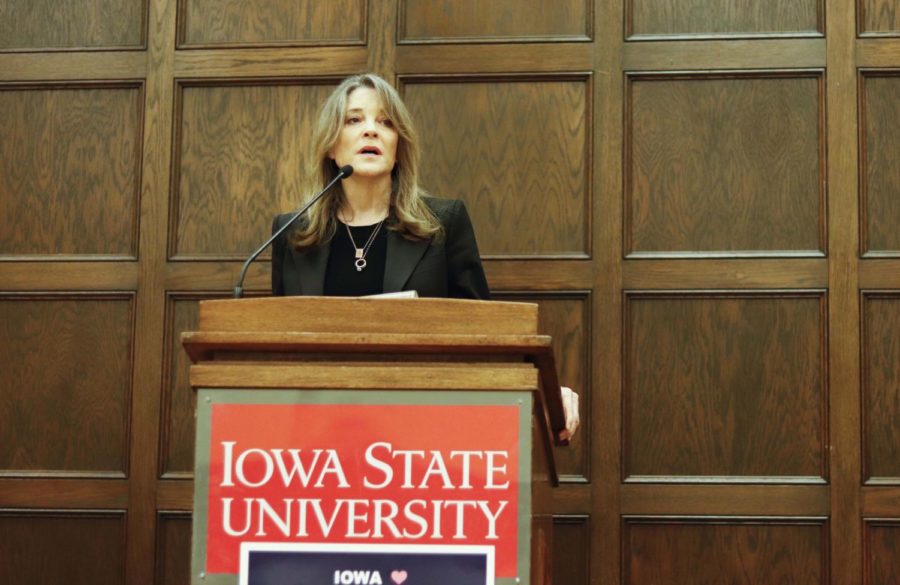Presidential candidate Marianne Williamson discusses love as a political force
Democratic presidential candidate Marianne Williamson delivers a lecture on April 2, 2019 at the Memorial Union. Her talk is part of the Campaign Series in 2019, giving university communities a chance to question candidates before the Iowa Caucuses.
April 2, 2019
Author and 2020 Democratic presidential candidate Marianne Williamson delivered a lecture on love and politics Tuesday in the Memorial Union.
Williamson’s campaign is focused on the power of love in politics, and while this was touched on throughout her lecture she spoke of all aspects of her platform.
A member of the audience asked Williamson how to show love to people across the aisle who “spew hate.”
“No one owes it to you to agree with you; no one owes it to you vote the way you do,” Williamson said. “We all need to purify our own hearts and look at our own house and do a little bit less finger pointing at the other people.”
The United States does not have universal healthcare, it does not have common sense gun laws, it does not fight climate change fast enough, because doing any of these would cut into the short-term profits of corporations, Williamson said.
There are places in the United States where children experience trauma and develop PTSD equivalent to those of veterans returning from Iraq and Afghanistan, William said. To combat this, Williamson said she would establish a “U.S. cabinet-level department of children and youth,”
On student loans, Williamson said there are studies on whether student loan debt could be simply canceled.
“At the very least, we could re-negotiate these loans and make them far less a burden,” Williamson said.
Throughout her speech and question and answer session, Williamson spoke of a “traditional political establishment.”
Williamson, who has never held political office, said of American society and the political system “the issue isn’t I don’t have their qualifications, the issue is they don’t have mine.”
One audience member asked Williamson how to ensure she will be invited to the 2020 Democratic primary debates. Williamson would need 65,000 unique campaign contributions by May 15 and said she currently needs about 25,000 more to qualify.
According to a recent Morning Consult poll, 66 percent of Democrats say decades of political experience is very or somewhat important to choosing a 2020 nominee.
In choosing a running mate, Williamson said she would want to choose someone who she would trust would be able to continue doing the job of president should she die early.
“Given that I have not worked within the political establishment before, I would be looking for someone who’s experienced in Washington,” Williamson said in an interview with the Daily.
Ross Wilburn, Diversity Officer and the associate program director for Community and Economic Development for Iowa State University Extension and Outreach, said it’s important to bring people together, and experience in elected office isn’t the only thing that matters. Wilburn said Williamson has a vision and a moral compass.
A recent YouGov poll found 20 percent of Democrats say the environment is the most important issue to them.
Williamson said if she were elected president she would appoint a world-class environmentalist as head of the EPA.
“I would also use the power of the bully pulpit to articulate to the American people the seriousness of this crisis, of this threat,” Williamson said.
Merlin Crabb, an Ames resident, said to Williamson he is one of the only males in his family who doesn’t have a felony.
“Once you get a felony, you don’t have access to some of the programs that are available for low-income people,” he said. “Are you committed to institutional and correctional reform to help voter registration for people who are incarcerated that can’t vote?”
Williamson said it is offensive people cannot vote due to felonies, because as Americans, the day they walk out of prison they are free under the American legal system.







